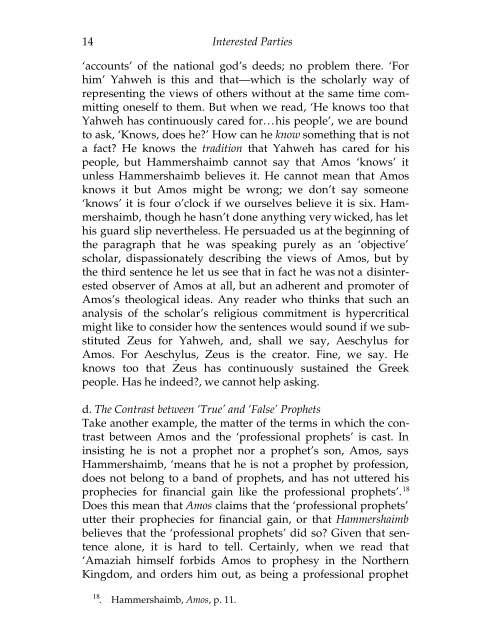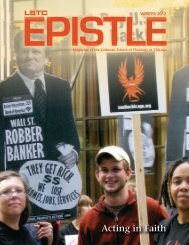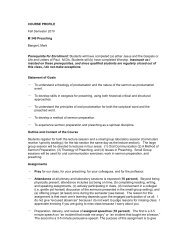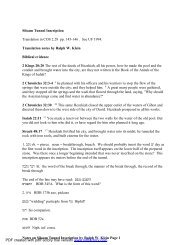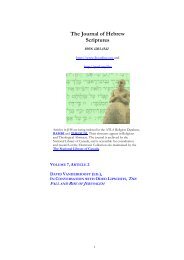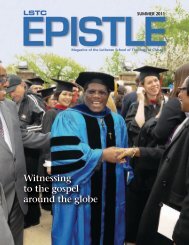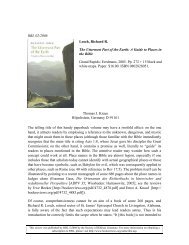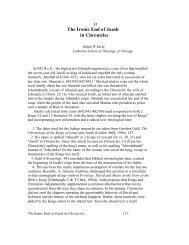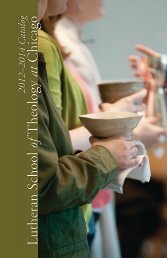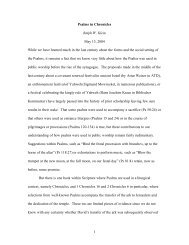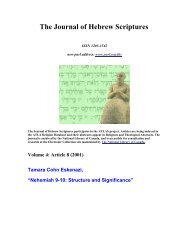Metacommentating Amos* Metacommentary, what is that ... - Fontes
Metacommentating Amos* Metacommentary, what is that ... - Fontes
Metacommentating Amos* Metacommentary, what is that ... - Fontes
Create successful ePaper yourself
Turn your PDF publications into a flip-book with our unique Google optimized e-Paper software.
14 Interested Parties‘accounts’ of the national god’s deeds; no problem there. ‘Forhim’ Yahweh <strong>is</strong> th<strong>is</strong> and <strong>that</strong>—which <strong>is</strong> the scholarly way ofrepresenting the views of others without at the same time committingoneself to them. But when we read, ‘He knows too <strong>that</strong>Yahweh has continuously cared for . . . h<strong>is</strong> people’, we are boundto ask, ‘Knows, does he?’ How can he know something <strong>that</strong> <strong>is</strong> nota fact? He knows the tradition <strong>that</strong> Yahweh has cared for h<strong>is</strong>people, but Hammershaimb cannot say <strong>that</strong> Amos ‘knows’ itunless Hammershaimb believes it. He cannot mean <strong>that</strong> Amosknows it but Amos might be wrong; we don’t say someone‘knows’ it <strong>is</strong> four o’clock if we ourselves believe it <strong>is</strong> six. Hammershaimb,though he hasn’t done anything very wicked, has leth<strong>is</strong> guard slip nevertheless. He persuaded us at the beginning ofthe paragraph <strong>that</strong> he was speaking purely as an ‘objective’scholar, d<strong>is</strong>passionately describing the views of Amos, but bythe third sentence he let us see <strong>that</strong> in fact he was not a d<strong>is</strong>interestedobserver of Amos at all, but an adherent and promoter ofAmos’s theological ideas. Any reader who thinks <strong>that</strong> such ananalys<strong>is</strong> of the scholar’s religious commitment <strong>is</strong> hypercriticalmight like to consider how the sentences would sound if we substitutedZeus for Yahweh, and, shall we say, Aeschylus forAmos. For Aeschylus, Zeus <strong>is</strong> the creator. Fine, we say. Heknows too <strong>that</strong> Zeus has continuously sustained the Greekpeople. Has he indeed?, we cannot help asking.d. The Contrast between ‘True’ and ‘False’ ProphetsTake another example, the matter of the terms in which the contrastbetween Amos and the ‘professional prophets’ <strong>is</strong> cast. Inins<strong>is</strong>ting he <strong>is</strong> not a prophet nor a prophet’s son, Amos, saysHammershaimb, ‘means <strong>that</strong> he <strong>is</strong> not a prophet by profession,does not belong to a band of prophets, and has not uttered h<strong>is</strong>prophecies for financial gain like the professional prophets’. 18Does th<strong>is</strong> mean <strong>that</strong> Amos claims <strong>that</strong> the ‘professional prophets’utter their prophecies for financial gain, or <strong>that</strong> Hammershaimbbelieves <strong>that</strong> the ‘professional prophets’ did so? Given <strong>that</strong> sentencealone, it <strong>is</strong> hard to tell. Certainly, when we read <strong>that</strong>‘Amaziah himself forbids Amos to prophesy in the NorthernKingdom, and orders him out, as being a professional prophet18 . Hammershaimb, Amos, p. 11.


